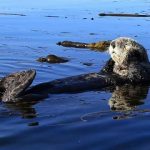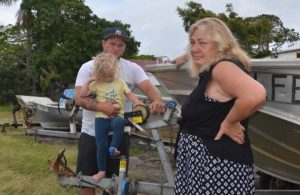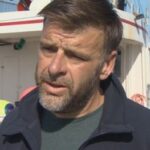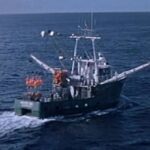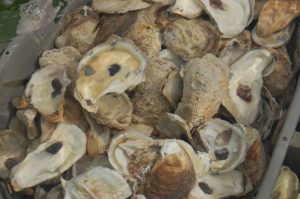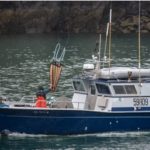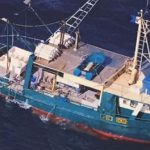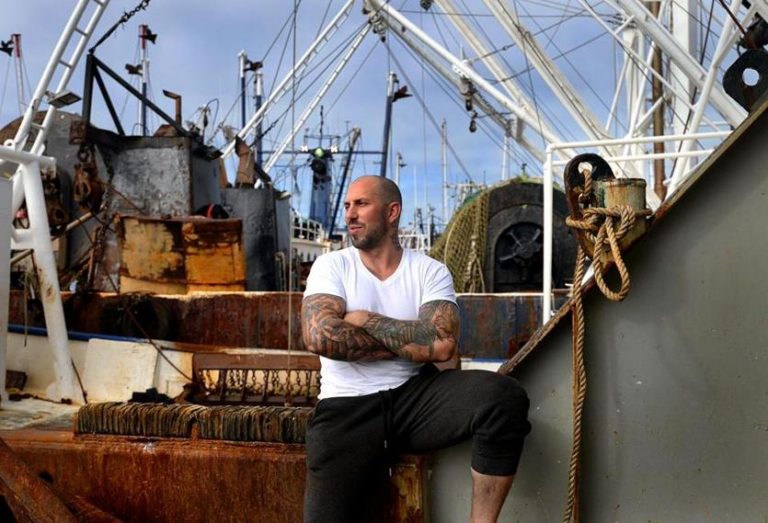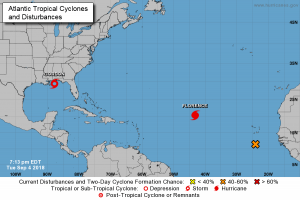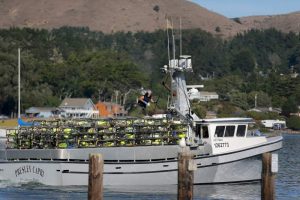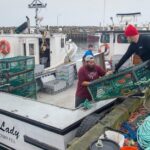Tag Archives: Council For Sustainable Fishing

Council for Sustainable Fishing – SAFMC Efforts to decrease the number of charter and headboats
Charter and headboat operators are now living one of these horror movies as the South Atlantic Fishery Management Council once again moves forward with limiting the number of for-hire snapper-grouper permits, this time through Snapper-Grouper Amendment 47. And now the SAFMC is not just talking about limiting the number of charter and headboats, they are now talking about decreasing the number. This has nothing to do with fishery sustainability. A limited-entry fishery is the first step toward a catch share fishery, one that will set up a “stock market” for permits. >click to read, comment<14:21

SAFMC decides for now to not limit the number of head and charter boats
Some good news. The South Atlantic Fishery Management Council at their meeting this month decided, at least for now, to not move forward with limiting the number of charter and head boats in the snapper-grouper fishery. The comments received by the SAFMC were overwhelmingly against limited entry. My thanks to all who submitted comments. One of the important points we made was that the SAFMC really doesn’t know what permitted snapper-grouper charter boats are catching or targeting, whether they are fishing in state or federal waters or even if permit holders are not fishing at all and simply banking the permit. click here to read the story 18:01
Stop efforts to limit the number of charter and head boats — the first step toward for-hire catch shares!
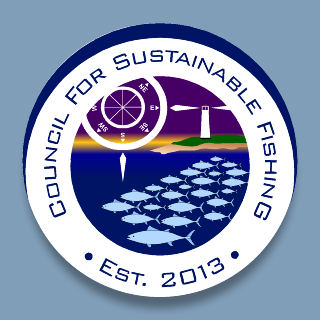 This Wednesday, June 13th, the South Atlantic Fishery Management Council will again consider snapper-grouper for-hire limited entry at its meeting in Ponte Vedra, Florida, so it’s important to tell the SAFMC that you oppose limited entry as soon as possible. Please click here today to submit a comment — just a sentence or two will do. Limited entry will set up a “stock market” for permits, setting the stage for charter and head boat catch shares — privatizing access to the fishery –- something that will destroy jobs and hurt fishing communities. click here to read the notice click here to make E-public comment by noon, 6/15/2017 07:32
This Wednesday, June 13th, the South Atlantic Fishery Management Council will again consider snapper-grouper for-hire limited entry at its meeting in Ponte Vedra, Florida, so it’s important to tell the SAFMC that you oppose limited entry as soon as possible. Please click here today to submit a comment — just a sentence or two will do. Limited entry will set up a “stock market” for permits, setting the stage for charter and head boat catch shares — privatizing access to the fishery –- something that will destroy jobs and hurt fishing communities. click here to read the notice click here to make E-public comment by noon, 6/15/2017 07:32
Don’t bite on risky lure of ‘catch shares’
 I can’t think of a more appropriate saying to use than “a wolf in sheep’s clothing” to describe the reality of what the Seafood Harvesters of America want to do with our offshore fisheries. The Post and Courier recently published an article and editorial that bought into the sheep’s clothing side. Year-round fishing and better fisheries data are touted. Who could be against that? But there’s a wolf: privatization of our fisheries through a scheme called “catch shares,” where fishermen and corporations are actually given ownership of our fisheries with shares that can be bought or sold like stock on Wall Street. That’s the real reason for the Seafood Harvesters of America’s existence. They’re working hard to ensure commercial fishermen own our fisheries, and in this case it’s our snapper and grouper, starting with a pilot program that could be considered by the South Atlantic Fishery Management Council and NOAA Fisheries next year. Read the op-ed here 08:02
I can’t think of a more appropriate saying to use than “a wolf in sheep’s clothing” to describe the reality of what the Seafood Harvesters of America want to do with our offshore fisheries. The Post and Courier recently published an article and editorial that bought into the sheep’s clothing side. Year-round fishing and better fisheries data are touted. Who could be against that? But there’s a wolf: privatization of our fisheries through a scheme called “catch shares,” where fishermen and corporations are actually given ownership of our fisheries with shares that can be bought or sold like stock on Wall Street. That’s the real reason for the Seafood Harvesters of America’s existence. They’re working hard to ensure commercial fishermen own our fisheries, and in this case it’s our snapper and grouper, starting with a pilot program that could be considered by the South Atlantic Fishery Management Council and NOAA Fisheries next year. Read the op-ed here 08:02
Better science and data, not catch shares
 With the exception of three mini-seasons (2012-2014) the red snapper fishery in the South Atlantic has been effectively closed for over six years. By most accounts from fishermen, red snapper are very plentiful – they are routinely encountered while fishermen target other species and divers report large schools. Yet, the stock assessment presented to the South Atlantic Fishery Management Council in June says that red snapper are still overfished and that overfishing is still occurring. This despite a lot of uncertainty about the data used in the assessment. Give the SAFMC credit for not accepting the assessment and asking its Scientific and Statistical Committee to reexamine the assessment and stock status determination this fall. The ongoing saga of the red snapper fishery highlights the fact that stock assessments can be flawed because of the lack of good biological and historical abundance information. In other words, much better science and data on our fisheries is needed. Instead of devoting adequate financial resources into stock assessments, NOAA has spent about $160 million over the last six years pushing its National Catch Share Policy in an effort to privatize fisheries. Studies have shown that catch share programs hurt fishing communities by destroying jobs and don’t provide any biological benefit to fisheries. 10:36
With the exception of three mini-seasons (2012-2014) the red snapper fishery in the South Atlantic has been effectively closed for over six years. By most accounts from fishermen, red snapper are very plentiful – they are routinely encountered while fishermen target other species and divers report large schools. Yet, the stock assessment presented to the South Atlantic Fishery Management Council in June says that red snapper are still overfished and that overfishing is still occurring. This despite a lot of uncertainty about the data used in the assessment. Give the SAFMC credit for not accepting the assessment and asking its Scientific and Statistical Committee to reexamine the assessment and stock status determination this fall. The ongoing saga of the red snapper fishery highlights the fact that stock assessments can be flawed because of the lack of good biological and historical abundance information. In other words, much better science and data on our fisheries is needed. Instead of devoting adequate financial resources into stock assessments, NOAA has spent about $160 million over the last six years pushing its National Catch Share Policy in an effort to privatize fisheries. Studies have shown that catch share programs hurt fishing communities by destroying jobs and don’t provide any biological benefit to fisheries. 10:36
Important South Atlantic Fishery Council actions last week
 Last week, the South Atlantic Fishery Management Council at its meeting in Hilton Head, SC disappointingly moved forward with more no-fishing zones and effectively deferred action on the snapper-grouper Vision Project until next month. The fishery council approved the following no-fishing spawning Special Management Zones as the preferred alternatives in proposed Snapper-Grouper Amendment 36. It was also a disappointment that the SAFMC did not remove job-killing catch shares, more closed fishing areas, and expensive and intrusive electronic vessel,,, Read the rest here 15:24
Last week, the South Atlantic Fishery Management Council at its meeting in Hilton Head, SC disappointingly moved forward with more no-fishing zones and effectively deferred action on the snapper-grouper Vision Project until next month. The fishery council approved the following no-fishing spawning Special Management Zones as the preferred alternatives in proposed Snapper-Grouper Amendment 36. It was also a disappointment that the SAFMC did not remove job-killing catch shares, more closed fishing areas, and expensive and intrusive electronic vessel,,, Read the rest here 15:24
State Rep. Goldfinch applauded for stance against offshore no-fishing zones
The Council for Sustainable Fishing, a regional advocacy group for recreational and commercial fishing interests, Thursday applauded state  , for his letter to the South Atlantic Fishery Management Council opposing additional offshore no-fishing zones. “We thank Rep. Goldfinch for standing up for fishing interests and the coastal economy and his recognition that there is simply no justification for any additional no-fishing areas in the South Atlantic,” Council for Sustainable Fishing Executive Director Tom Swatzel said. Read the rest here 09:19
, for his letter to the South Atlantic Fishery Management Council opposing additional offshore no-fishing zones. “We thank Rep. Goldfinch for standing up for fishing interests and the coastal economy and his recognition that there is simply no justification for any additional no-fishing areas in the South Atlantic,” Council for Sustainable Fishing Executive Director Tom Swatzel said. Read the rest here 09:19
Be heard on proposed fishery regulations in the South Atlantic Fishery Council Region
 The South Atlantic Fishery Management Council is keeping fishermen busy this summer with public comment meetings. Last month, there was a series of hearings/listening stations on the snapper-grouper Vision Project, which includes overwhelmingly opposed measures such as catch shares, electronic monitoring, and more closed fishing areas. Next week, beginning in South Carolina, the SAFMC is conducting public hearings (close to final action) and scoping (initial stages of development) on four snapper-grouper amendments and will also continue to take comments on the Vision Project. Read the rest here 13:20
The South Atlantic Fishery Management Council is keeping fishermen busy this summer with public comment meetings. Last month, there was a series of hearings/listening stations on the snapper-grouper Vision Project, which includes overwhelmingly opposed measures such as catch shares, electronic monitoring, and more closed fishing areas. Next week, beginning in South Carolina, the SAFMC is conducting public hearings (close to final action) and scoping (initial stages of development) on four snapper-grouper amendments and will also continue to take comments on the Vision Project. Read the rest here 13:20
Help stop “catch shares” and more in the South Atlantic
 Last year, the SAFMC promised that the Vision Project would be “stakeholder-driven” (click here, third paragraph) and conducted 26 “port meetings” that were supposed to seek stakeholder input into the project. These meetings produced overwhelming input from stakeholders, like you, that catch shares, vessel monitoring systems, and more closed areas like MPAs, are vehemently opposed, and should not be in the plan. Breaking its promise of a stakeholder-driven plan, the SAFMC has now included those overwhelmingly opposed measures in its Vision Project plan! Read the rest here 10:30
Last year, the SAFMC promised that the Vision Project would be “stakeholder-driven” (click here, third paragraph) and conducted 26 “port meetings” that were supposed to seek stakeholder input into the project. These meetings produced overwhelming input from stakeholders, like you, that catch shares, vessel monitoring systems, and more closed areas like MPAs, are vehemently opposed, and should not be in the plan. Breaking its promise of a stakeholder-driven plan, the SAFMC has now included those overwhelmingly opposed measures in its Vision Project plan! Read the rest here 10:30
Council for Sustainable Fishing based in Inlet is watchdog for fishermen
 Federal regulations on the fishing industry over the last several years were the catalyst for Mershon and Swatzel to form the Council for Sustainable Fishing, a nonprofit watchdog group for fishermen from North Carolina to the Florida Keys. They started the nonprofit group in December 2013. One big issue the fishing industry faces is the “catch share” program. Read the rest here 14:42
Federal regulations on the fishing industry over the last several years were the catalyst for Mershon and Swatzel to form the Council for Sustainable Fishing, a nonprofit watchdog group for fishermen from North Carolina to the Florida Keys. They started the nonprofit group in December 2013. One big issue the fishing industry faces is the “catch share” program. Read the rest here 14:42
Council for Sustainable Fishing – Working to prevent a grouper closure and catch shares
 Last week, I attended the South Atlantic Fishery Management Council meeting in Charleston, SC and wanted to make you aware of some important decisions made by the council. While the council approved increased Annual Catch Limits for a number of unassessed snapper-grouper species such as gray triggerfish (commercial and recreational ACLs will increase by about 40,000 lbs. and 51,000 lbs. respectively next year), the council was on the verge of slashing the overall scamp grouper ACL by over 40 percent, which had the potential of hurting fishermen, particularly in the Carolinas. Read the rest here
Last week, I attended the South Atlantic Fishery Management Council meeting in Charleston, SC and wanted to make you aware of some important decisions made by the council. While the council approved increased Annual Catch Limits for a number of unassessed snapper-grouper species such as gray triggerfish (commercial and recreational ACLs will increase by about 40,000 lbs. and 51,000 lbs. respectively next year), the council was on the verge of slashing the overall scamp grouper ACL by over 40 percent, which had the potential of hurting fishermen, particularly in the Carolinas. Read the rest here
Red snapper catches reported as outstanding, stock assessment needed now
 After two of the three weekends of the red snapper recreational mini-season, outstanding catches have been reported throughout the South Atlantic region. Here are some of the news reports: Read more here 14:06
After two of the three weekends of the red snapper recreational mini-season, outstanding catches have been reported throughout the South Atlantic region. Here are some of the news reports: Read more here 14:06
Long-time NC fishing leader, head boat operator elected to Council for Sustainable Fishing board
 MURRELLS INLET, SC – Sonny Davis, owner of the Capt. Stacy Fishing Center in Atlantic Beach, NC and a life-long fishing industry veteran, last week was elected to the board of directors of the Council for Sustainable Fishing, a nonprofit fishing advocacy group focused on optimizing and sustaining fishing opportunities for commercial and recreational fishermen in the South Atlantic region. Read more here 09:18
MURRELLS INLET, SC – Sonny Davis, owner of the Capt. Stacy Fishing Center in Atlantic Beach, NC and a life-long fishing industry veteran, last week was elected to the board of directors of the Council for Sustainable Fishing, a nonprofit fishing advocacy group focused on optimizing and sustaining fishing opportunities for commercial and recreational fishermen in the South Atlantic region. Read more here 09:18
SAFMC halts MPA effort, includes catch shares in top ten list
 The SAFMC has been pushed hard for over two years by radical environmental groups like the Natural Resources Defense Council, Environmental Defense Fund, and Pew to approve the proposed MPAs even though the SAFMC’s own scientific advisors have said there is no scientific justification. It is of great concern that at last week’s SAFMC meeting, when council members submitted their top three issues/solutions as part of the snapper-grouper fishery “visioning” process, catch shares made it into the top ten issues for consideration. Read more here 14:04
The SAFMC has been pushed hard for over two years by radical environmental groups like the Natural Resources Defense Council, Environmental Defense Fund, and Pew to approve the proposed MPAs even though the SAFMC’s own scientific advisors have said there is no scientific justification. It is of great concern that at last week’s SAFMC meeting, when council members submitted their top three issues/solutions as part of the snapper-grouper fishery “visioning” process, catch shares made it into the top ten issues for consideration. Read more here 14:04
We’re working to change who manages our fisheries
 The 13 voting members of the SAFMC drive federal fishery management policy off the coasts of the Carolinas, Georgia and east Florida. They will decide whether fishermen have the following: Over 1,000 sq. miles of additional, scientifically unjustifiable no-fishing zones or Marine Protected Areas. Job killing “catch shares” schemes. Unnecessary, expensive and intrusive Vessel Monitoring Systems. A red snapper fishery closure that extends beyond the current four years. The two seats up for appointment in June,, Read more here 08:32
The 13 voting members of the SAFMC drive federal fishery management policy off the coasts of the Carolinas, Georgia and east Florida. They will decide whether fishermen have the following: Over 1,000 sq. miles of additional, scientifically unjustifiable no-fishing zones or Marine Protected Areas. Job killing “catch shares” schemes. Unnecessary, expensive and intrusive Vessel Monitoring Systems. A red snapper fishery closure that extends beyond the current four years. The two seats up for appointment in June,, Read more here 08:32
Seafood operations director of Atlanta-based Halperns’ elected to Council for Sustainable Fishing board
 “Having been born and raised in Charleston, South Carolina, the South Atlantic fishery is of very special interest to me. Today we have to be the caretakers, watching out for the many men and women that fish there, while also protecting the environment for our future generations. Collectively we can make a difference,” Cheryl Fuller said. Read more@ Council For Sustainable Fishing 08:17
“Having been born and raised in Charleston, South Carolina, the South Atlantic fishery is of very special interest to me. Today we have to be the caretakers, watching out for the many men and women that fish there, while also protecting the environment for our future generations. Collectively we can make a difference,” Cheryl Fuller said. Read more@ Council For Sustainable Fishing 08:17
Tell the SAFMC how you want the snapper-grouper fishery managed!
 The South Atlantic Fishery Management Council is developing a long-term “vision” for managing the snapper grouper fishery. Next week, beginning in South Carolina, the fishery council will begin a series of “port meetings” to seek input from commercial and recreational snapper-grouper fishermen, dealers, chefs and others who have a stake in the fishery as to how the fishery should be managed long-term. Read [email protected] 20:51
The South Atlantic Fishery Management Council is developing a long-term “vision” for managing the snapper grouper fishery. Next week, beginning in South Carolina, the fishery council will begin a series of “port meetings” to seek input from commercial and recreational snapper-grouper fishermen, dealers, chefs and others who have a stake in the fishery as to how the fishery should be managed long-term. Read [email protected] 20:51
Important meetings in Florida and Georgia this week! – Council for Sustainable Fishing
 This week, the South Atlantic Fishery Management Council will conduct public input meetings in Florida and Georgia on proposed fishery management plan amendments that will affect the black sea bass trap fishery, gray triggerfish, Spanish and king mackerel, and how Annual Catch Limits are calculated on some unassessed snapper-grouper species. Click here for the public meeting schedule, how to submit written comments and the amendment documents. 15:25 Click here for Council for Sustainable Fishing
This week, the South Atlantic Fishery Management Council will conduct public input meetings in Florida and Georgia on proposed fishery management plan amendments that will affect the black sea bass trap fishery, gray triggerfish, Spanish and king mackerel, and how Annual Catch Limits are calculated on some unassessed snapper-grouper species. Click here for the public meeting schedule, how to submit written comments and the amendment documents. 15:25 Click here for Council for Sustainable Fishing
Council For Sustainable Fishing – Urgent — there are looming threats to fishing in 2014!
 We always hope for the best for a new year, but unfortunately commercial and recreational fishing interests face the looming threats in 2014 of more no-fishing zones, job killing “catch shares” schemes and congressional inaction on fixing the badly flawed Magnuson-Stevens Act, among others. Read more@councilforsutainablefishing 17:31
We always hope for the best for a new year, but unfortunately commercial and recreational fishing interests face the looming threats in 2014 of more no-fishing zones, job killing “catch shares” schemes and congressional inaction on fixing the badly flawed Magnuson-Stevens Act, among others. Read more@councilforsutainablefishing 17:31







 Of the 469 stocks managed by the eight regional fishery management councils, the status of 161 stocks is unknown for lack of stock assessments. In the South Atlantic, of the 59 species in the snapper-grouper fishery, the stock status is unknown for 76 percent or 45 species. Additionally, the status is unknown for important top-water species like dolphin (mahi) and wahoo. For stocks with an unknown status, the only way to set an annual catch limit is to use historical landings, which has no real scientific basis, and can unfairly penalize fishermen with artificially low catch limits. Instead of devoting adequate financial resources into stock assessments, NOAA has spent about $160 million over the last six years pushing its National Catch Share Program,,,
Of the 469 stocks managed by the eight regional fishery management councils, the status of 161 stocks is unknown for lack of stock assessments. In the South Atlantic, of the 59 species in the snapper-grouper fishery, the stock status is unknown for 76 percent or 45 species. Additionally, the status is unknown for important top-water species like dolphin (mahi) and wahoo. For stocks with an unknown status, the only way to set an annual catch limit is to use historical landings, which has no real scientific basis, and can unfairly penalize fishermen with artificially low catch limits. Instead of devoting adequate financial resources into stock assessments, NOAA has spent about $160 million over the last six years pushing its National Catch Share Program,,, 


























